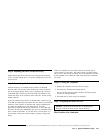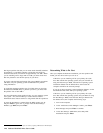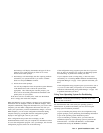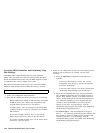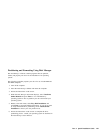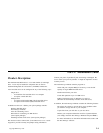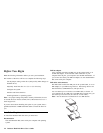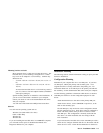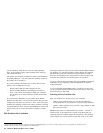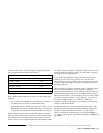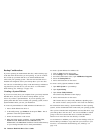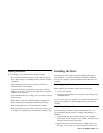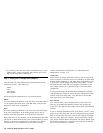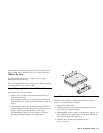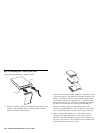
Mounting brackets and tools
Most computers have 3.5-inch and 5.25-inch drive bays. The
hard disk drive you are installing is designed for a 3.5-inch
bay, but it can be adapted to a 5.25-inch bay. Common bay
dimensions are:
– 3.5-inch—10.2 cm x 15.2 cm x 2.6 cm (4 in. x 6 in. x 1
in.)
– 5.25-inch—15.2 cm x 20.3 cm x 4.1 cm (6 in. x 8 in. x
1.63 in.)
To mount the hard disk drive in a 5.25-inch bay, attach a
pair of 3.5-inch to 5.25-inch adapter brackets (included in
some option packages).
Special mounting hardware is needed for some installations. If
you are not sure about what is needed for your computer,
contact your dealer or refer to the documentation that comes
with your computer.
You will need a flat-blade and a Phillips-head screwdriver.
Software
You will need an operating system such as:
Windows 3.X (under DOS 5.0 or later)
OS/2 or OS/2 Warp
Windows 95
Windows NT
If you are installing the hard disk drive in an IBM PS/2 computer,
you will need current copies of the Reference Diskette and
Diagnostic Diskette for your computer.
Installation Planning
The following sections contain information to help you plan your hard
disk drive installation.
Configuration Planning
Determine if your computer has one or two IDE ports. If you have
two IDE ports, identify the primary and secondary ports. Your
original hard drive is usually connected to the primary port. For
information about how to tell which port is the primary and which is
the secondary, see the documentation that comes with your computer.
Use the following guidelines to determine which devices to attach to
each IDE port and how to set the configuration jumpers for each
device.
Attach hard disk drives to the cable on the primary IDE port.
Attach slower devices, such as CD-ROM or tape drives, to the
cable on the secondary port.
On each IDE port, only one device can be configured as master
and one configured as slave. Some drives must be configured as
master with slave present when you have two devices on the
same IDE port. This configuration is normally used when the
slave drive is an older model that does not comply with the
ATA-2 standard.
If you must attach a hard disk drive on the same IDE port with a
slower device, configure the hard disk drive as the master and the
slower device as slave. Check the documentation for the device
Part 2: Installation Guide 2-3



